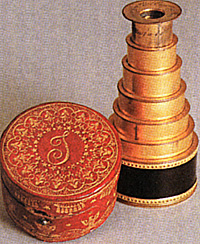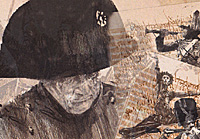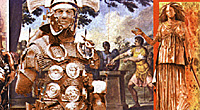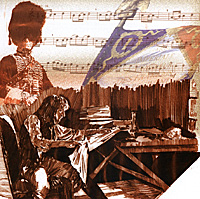 On 12 July, 1795, Napoleon wrote to his brother Joseph from Paris that he was astonished to see how quickly "luxury, pleasure, and the arts" had reappeared after the Revolutionary upheaval.
On 12 July, 1795, Napoleon wrote to his brother Joseph from Paris that he was astonished to see how quickly "luxury, pleasure, and the arts" had reappeared after the Revolutionary upheaval.
Josephine's opera glass, part of the exhibition at the Historisches Museum der Pfalz in Speyer, Germany.
He had attended a performance of Phedre at the Opera where he was impressed with the "immense crowd,. . . the carriages, and the elegant patrons." A world of culture and refinement was reestablishing itself, as if the excesses of the Revolution had never happened. Perhaps this was the first time that Napoleon sensed the full possibilties of the arts, and
Thus, when he became Emperor in 1804, he focused on Opera as a primary art form to celebrate and glorify his reign.
Ever since the fall of Louis XVI, France had been without a stable government, and the arts suffered from a lack of patronage. The fractioned governments of the Revolution, which never had gained control, were followed by the ineffectual Directory. The successive coups led various politicians to believe that it was necessary to increase executive power in order to bring the country together. In 1799, France was at war with most of Europe and, in France itself, counter-revolutionary forces were again gathering.
Napoleon aspired to make
the Opera the premier
music theater in Europe...
Abbe Sieyes and Bonaparte, who had just returned from Egypt, made plans for the successful coup d'etat of 18 brumaire (9 and 10 November, 1799). Bonaparte's task, as First Consul, was to take control, to bring order out of chaos, and to rally the people behind him. He took advantage of every opportunity to fulfill these goals, even using institutions such as the Opera for indoctrinational ends.
Napoleon aspired to make the Opera the premier music theater in Europe, essential in re-establishing France as the European cultural arbiter it had been for the one hundred and fifty years prior to the Revolution.
It was the Emperor's goal not merely to maintain France's past superiority in the sciences, letters, and arts, but to surpass it. In the area of opera, Napoleon's ambition was to create an institution which would enhance the reputation of la Patrie for excellence, elegance, and cultivation; increase the prestige of his rule; and heighten his gloire. For Napoleon gloire meant more than just "glory". It meant the obligation to play out the role his "destiny" or "star" assigned to him, bringing honor not only to himself but also to France.
To make certain that his message reached the most influential people, Napoleon gave the Opera irresistible appeal by making it the social center of Paris, where all the elite gathered. When in Paris, he frequently attended the Opera and, although he never remained for an entire performance, his mere appearance stirred excitement. When he was on a military campaign, he kept abreast in minute detail of the Opera's activities and, in turn, the announcements of his victories were made between acts at the Opera.
As First Consul and then as Emperor, he took a personal interest in all activities at the Opera, making certain that they met his aims. After the coup of 18 brumaire, however, his immediate tasks were to establish order and to retain the power he had now seized. He needed to heal the wounds left by the Revolution, to bring stability to France, and to unite the various factions.
Napoleon gave the Opera
irresistible appeal by making
it the social center of Paris...
In a letter written in 1799, Napoleon asked theater directors to avoid pieces "that gratuitously insulted the defeated and obsequiously flattered the victors". He wanted "scenes that expressed sentiments of peace, moderation, wisdom, grand and generous passions written in a lofty, inspiring language". References that "foster divisions, encourage hatreds, or dwell on the bitter struggles of the past" would not be tolerated. When theaters try to provoke such reactions, it is an indication of "a weak and unjust government" which, according to Napoleon, France no longer had.
When he became Emperor in 1804, however, Napoleon's ambitions changed and the purposes of control changed with them. His subjects needed to be shown the reasons for an emperor, for a dynasty, and for the continual wars. They had to be courageous and to make sacrifices for France and for the Emperor Operas and dramas could set examples of how to live and how to die. The words of the libretto and the cast of characters could make analogies so strongly that few patrons would escape the meaning. To succeed to that extent, further regulations were necessary.
 From the establishment of the Consulate in 1799 until the last of the Hundred Days in 1815, control increased through a continuous movement toward governmental administration of the Opera
by men who were directly responsible to Napoleon and who often were his close associates. Early in 1800, Napoleon appointed his brother Lucien as Interior Minister, with the Theatre de la
Republique et des Arts, as the Opera was then called, under his jurisdiction. Only months later, Lucien was appointed ambassador to the court of Madrid, with Jean-Antoine Chaptal succeeding him as Interior Minister until 1804.
From the establishment of the Consulate in 1799 until the last of the Hundred Days in 1815, control increased through a continuous movement toward governmental administration of the Opera
by men who were directly responsible to Napoleon and who often were his close associates. Early in 1800, Napoleon appointed his brother Lucien as Interior Minister, with the Theatre de la
Republique et des Arts, as the Opera was then called, under his jurisdiction. Only months later, Lucien was appointed ambassador to the court of Madrid, with Jean-Antoine Chaptal succeeding him as Interior Minister until 1804.
In 1801, Chaptal reorganized the regulations governing the opera by appointing a special opera commissioner whose sole function was surveillance of that theater. With the consular decrees of 3 and 27 November, 1802 and of 10 January, 1803 the supervision of the Opera was transferred from the Interior Ministry to the household of the First Consul under the direct supervision of the Palace Prefect.
These decrees placed the Theatre des Arts (the word "Republique" was now omitted from the title) completely under Napoleon's control through the supervision of this Palace Prefect, Jean-Baptiste-Charles Le Gendre de Lucay, later to be ennobled by Napoleon.
The Imperial Decree of 8 June, 1806 established the policy of, privilege, whereby the Interior Minister determined the repertoire category for each of the four grand theatres, i.e., l'Acadimie Imperiale de Musique, l'Opira-Comique, la Comedie Francaise, and l'0deon, which were the government-subsidized theaters. No other theater in Paris was then permitted to mount pieces of the same type.
Now, not only the Prefect approved the repertoire for the Opera but also the Ministers of Police and the Interior as well. The legal basis for censorship under the Empire had thus been extended to not only Jean Baptiste de Nompere de Champagny, the Minister of Interior from 1804-1807, but also to Joseph Fouche, who had regained his position as Minister of General Police in 1804 and retained it until 1810 (and later held by Anne-jean-Marie-Rene Savary).
Napoleon established a coterie
of French writers and musicians
dedicated to him and willing to
work within his specifications.
With the Imperial decree of 1 November, 1807, Napoleon eliminated the position of Palace Prefect, replacing it with a Superintendent of Spectacles from his own household to take charge of these four theaters and to approve their presentations. Napoleon named AugustinLaurent, Comte de Remusat, to that new position.
Through decrees and the judicious appointment of committee members, Napoleon had established administrative control over the Opera. He also had gained final approval of the selection of the repertoire, ensuring that it very much reflected his taste and purposes.
Napoleon commented in a letter written in 1805 that he "heard some very good music yesterday [Mozart's Don Giovanni]. However, German singing seemed a little outlandish to me." Although Napoleon's preference was for Italian music and especially Italian singing, his political purposes were best served by French music and French musicians. By using a variety of rewards such as government positions, stipends, pensions, cash gifts, or decorations, Napoleon established a coterie of French writers musicians dedicated to him and willing to work within his specifications.
Madame de Remusat, whose famous memoirs provide fascinating insight into the reign of Napoleon, characterized the money Napoleon made available for artists as "prodigious". Not only were they well-rewarded for their efforts on behalf of Emperor and Empire, but also, she wrote, "the Revolution had made them a part of Society, occupying an agreeable rank." Indeed, artists, writers, and musicians were accepted as individuals, elevated beyond the status of mere entertainers that they held in the Old Regime.
The fact that some were selected to be members of the Legion of Honor indicates Napoleon's esteem for the creatively talented and, no doubt, reflects his desire to retain their valued support. Madame Remusat believed that Napoleon was able to inspire the imaginations of artists and poets even though, in her opinion, he may have frozen the expression of their deepest thoughts. His support of artists and, in return, their enthusiasm for the Emperor, led them to use their talents to enhance his gloire.
Although patronage of the arts as a means of political control was certainly nothing new and no doubt viewed as less sinister in the 19th Century than in the late 20th -- Napoleon's flair for motivating and inspiring these artists led to the creation of a body of artistic work that would become the basis for an enduring Cult of Napoleon.
The censors, Palace Prefect, Interior Minister, and Minister of Police reviewed pieces from the Old Regime already in the repertoire to see if they presented any conflict with current policies. Revisions would be made accordingly and then they, too, were subject to final approval by Napoleon. The most direct approach to indoctrination were the pieces de circonstance written for a specific propagandistic or political purpose. The ideas for the works were conceived at times by Fouche, Savary, the Interior Minister, or even by Napoleon himself.
 As an illustration, in 1806,
Champagny sought to arrange a theatrical
celebration for the anniversaries of
Napoleon's coronation (2 December, 1804)
and the battle of Austerlitz (2 December,
1805). He suggested stories by several
writers as possible subjects for operas,
cantatas or other music pieces. Instead,
L'Inauguration du Temple de la
Victoire, whose subject initially had
been proposed by Napoleon to Fouche, was
chosen and produced in time to celebrate
the beginning of the new year. This
intermede was a mixture of songs
by Jean-Francois Le Sueur and Louis Luc
Loisseau de Persuis and dances by Pierre Gardel,
the most celebrated choreographer in
the Napoleonic era. Intended to glorify the
brilliant successes of Napoleon's armies
during the past year and the heroes who
had achieved them, this propagandistic
piece, rife with allegory, included Clio, the
Muse of history, and other Muses
descending from the flies of the theater in
a golden chariot to unite with Winged Victory.
As an illustration, in 1806,
Champagny sought to arrange a theatrical
celebration for the anniversaries of
Napoleon's coronation (2 December, 1804)
and the battle of Austerlitz (2 December,
1805). He suggested stories by several
writers as possible subjects for operas,
cantatas or other music pieces. Instead,
L'Inauguration du Temple de la
Victoire, whose subject initially had
been proposed by Napoleon to Fouche, was
chosen and produced in time to celebrate
the beginning of the new year. This
intermede was a mixture of songs
by Jean-Francois Le Sueur and Louis Luc
Loisseau de Persuis and dances by Pierre Gardel,
the most celebrated choreographer in
the Napoleonic era. Intended to glorify the
brilliant successes of Napoleon's armies
during the past year and the heroes who
had achieved them, this propagandistic
piece, rife with allegory, included Clio, the
Muse of history, and other Muses
descending from the flies of the theater in
a golden chariot to unite with Winged Victory.
Immediately following in the operatic season was another piece de circonstance, Le Retour d'Ulysse. From Potsdam on October 25, 1806, Napoleon wrote to Fouche that he was sending his approval for the expenses of this heroic ballet. He asked Fouche to attend the first performance and to make detailed report of the ballet. "This subject seems beautiful to me," Napoleon said. "It is I who gave it to Gardel." Persuis wrote the music for this work, which had its premier on 27 February, 1807 [while Napoleon was on campaign in Poland, having just fought the horrific battle of Eylau].
Trajan was never a great opera
but it was a great spectacle...
with live prancing horses, lavish
costumes, and a huge cast...
There were eighteen performances of the ballet, considered a good number for pieces de circonstance because -- usually having been conceived for a specific event -- their relevance did not last long.
Le Triomphe de Trajan, first performed 23 October, 1807, was the most ambitious piece de circonstance undertaken during the Napoleonic era. In an attempt to please the Emperor, Fouche seized upon an act of clemency by Napoleon to draw a corollary between him and Trajan. The Prince of Halzfeld had been accused of conspiring against Napoleon, but his wife pleaded with the Emperor to forgive him. Napoleon burned the incriminating evidence saying, "You see, Madame, I can no longer condemn, the proof no longer exists." The parallel is drawn with the story that Trajan pardoned Decebalus, the powerful son of the last Dacian king, by burning in the sacred altar fire a letter which indicated that the Prince was a conspirator in an assassination attempt.
In the opera Trajan sings, "Caesar no longer has proof and cannot condemn." The obvious intent was to equate Napoleon with the Roman emperors and to show that great emperors could be firm when necessary and lenient when possible.
Trajan was never a great opera but it was a great spectacle. The weaknesses in the libretto by JosephEtienne Esmenard and the score by Persuis were compensated for by Gardel's ballet and the extravagant staging. Trajan was the Aida of its time, with live prancing horses, lavish costumes, and a huge cast, plus the ballets of Gardel.
Special events, such as the birth of Napoleon's legitimate heir, the King of Rome, demanded special commemoration. Almost two hundred pieces de circonstance were written and submitted to the Police Minister. The censors were overwhelmed, and no doubt discouraged that there could be so much hack work by Frenchmen. The offerings were classified in three categories "good pieces," "mediocre pieces" and "bad pieces." For every "good" there were eight "mediocre," and twelve "bad".
Ultimately chosen was le Triomphe du Mois de Mars ou Le Berceau d'Achille, an allegorical opera-ballet. The music was written by Rodolphe Kreutzer, the words by Emanuel Dupaty, and the ballet was again under Gardel's direction. The first presentation took place on 27 March, 1811, just one week after the baby's birth. The police bulletin for the following day stated that generally the opera was displeasing.
The performers did not even know their roles. At times the only way the audience kept itself from laughing was by remembering the occasion they were celebrating. The report further stated that it was "totally ridiculous" that a work of that type would appear at the Opera when it was more suitable for Vaudeville. It nevertheless managed three more performances.
 As can be seen from these
titles, the Emperor's predilection for
neoclassicism is reflected in the
Opera's repertoire. The themes of
Roman virtue and personal sacrifice for
the state were a favorite means of
indoctrination. During the period from
1800 to 1815, there were sixty-four
new productions of operas, cantatas,
ballets and other genre at the Opera.
As can be seen from these
titles, the Emperor's predilection for
neoclassicism is reflected in the
Opera's repertoire. The themes of
Roman virtue and personal sacrifice for
the state were a favorite means of
indoctrination. During the period from
1800 to 1815, there were sixty-four
new productions of operas, cantatas,
ballets and other genre at the Opera.
The stories of twenty-one (about fifty-five percent) were themes from ancient Rome or Greece, such as Castor et Pollux, Le Triomphe de Trajan, Les Horaces and La Vestale. Twelve were essentially Romantic and four Biblically based. The fact that an opera was Classical, Romantic or Biblical did not preclude its being used with indoctrinational ends in view, and the new works were usually conceived for that purpose.
In the later Napoleonic era more of the recent productions were presented than ones from the Old Regime, but it was the older, traditional operas which appeared to have the greater box-office appeal. To illustrate this, Sacchini's Oedipe a Colone which opened in February 1787, had played three hundred thirty-seven times by 1815. Alceste by Gluck was performed throughout the Empire, having been revised five times. Rousseau's Le Devin du Village also remained in the repertoire, undergoing fourteen remountings. Gretry's Anacreon Chez Polycrate was revised three times and played 136 times from January 1797 until December 1825.
Thus, of the eighteen pre-Revolutionary operas, five had more than one hundred performances, nine fell in the range between thirty-six and ninety, and only four had fewer.
The thirty-eight operas from the Consulate and Empire cannot match that record. Only Le Triomphe de Trajan and Gaspare Spontini's La Vestale achieved more than one hundred performances. Ossian ou Les Bardes by Le Sueur attained sixtyfive performances and was obviously popular because, of the twenty best paid attendances for 1804, sixteen were for Les Bardes. There were five operas that played between thirty and sixty times, twenty operas that played between ten and thirty times, while six operas had five or fewer performances. With such limited runs in their own time, it is not surprising that the new operas did not make a place for themselves in the post- Napoleonic era. In fact, only La Vestale remained in the standard repertoire into the 1830's whereas Le Triomphe de Trajan was revised and presented during the Bourbon Restoration and then was forgotten.
The apparent lack of interest by the public, who preferred the repertoire from the Old Regime, is not necessarily an indication of the merit of the new productions. Audiences have a tendency to resist what is new and cling to the comfort of the familiar. The preference for neo-classicism of Napoleon and the others who selected the Opera repertoire undoubtedly existed in the concertgoers as well, as evidenced by the continuation of the cult of antiquity longer in France than in the rest of Europe. Although the audiences enjoyed the opulent, overwhelming extravaganzas such as Le Triomphe de Trajan as spectacles, the preference generally was for Gluck and Sacchini. Because many works were propagandistic, their interest was naturally short-lived.
For Napoleon, everything in the Empire had to serve the Empire, and the Academie de Musique was no exception. His use of that institution for indoctrination may not have been as effective as he would have wished, but it greatly contributed to his mystique and the never-dying cult of Napoleon.
Rachel R. Schneider earned a doctorate in European History from the University o Akron (Ohio). This article was originally presented at a seminar at the Western Society for French Historical Studies.
Back to Table of Contents -- Napoleon #13
Back to Napoleon List of Issues
Back to MagWeb Master Magazine List
© Copyright 1998 by Napoleon LLC.
This article appears in MagWeb (Magazine Web) on the Internet World Wide Web.
The full text and graphics from other military history magazines and gaming magazines are available at http://www.magweb.com
Order Napoleon magazine direct